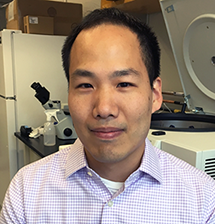Our lab is broadly interested in applying chemical biology to investigate gene regulation. We develop chemical and molecular biology tools to allow new measurements and perturbations in biological systems. We use these tools with other chemical and genetic approaches to study mechanisms of gene regulation and dysregulation in cancer.
GENE REGULATION AND CANCER EPIGENETICS
We are interested in studying protein function and small molecule mechanism of action in the context of chromatin regulation. To do this, we are pioneering technologies to interrogate protein function based on pooled CRISPR-induced mutagenesis to systematically mutagenize target proteins directly in cells. We have demonstrated that such approaches can enable the identification of alleles conferring drug resistance, allowing the mapping of small molecule-protein structure-function relationships. We are expanding these approaches to investigate protein complex function and potential mechanisms of allosteric control. Our long-term aim is to understand how these processes are dysregulated in cancer and uncover novel therapeutic opportunities.
See our study applying this technique, CRISPR-suppressor scanning, to elucidate the mechanism of action of a leukemia drug targeting the histone demethylase LSD1: Vinyard et al. Nat. Chem. Biol.15, 529 (2019).
CHEMICAL APPROACHES FOR FUNCTIONAL GENOMICS
We are developing molecular biology tools leveraged with next-generation sequencing to study chromatin conformation, transcription, and translation. To enable these and other efforts, we are interested in the chemical synthesis of small molecules and their functional derivatives. These probe molecules will be derived both rationally and also from natural products.
See our study investigating structure-activity relationships of the translation inhibitor cycloheximide: Park et al. Angew. Chem. Int. Ed. 58, 5387 (2019).


